牛津译林版八年级下Unit 4 A good read课件(34张ppt)
文档属性
| 名称 | 牛津译林版八年级下Unit 4 A good read课件(34张ppt) |

|
|
| 格式 | ppt | ||
| 文件大小 | 298.5KB | ||
| 资源类型 | 教案 | ||
| 版本资源 | 牛津译林版 | ||
| 科目 | 英语 | ||
| 更新时间 | 2022-01-03 18:12:03 | ||
图片预览


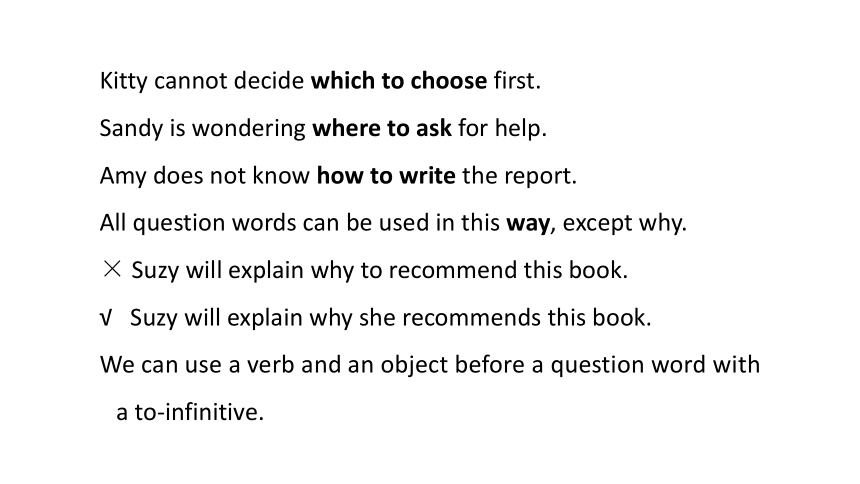

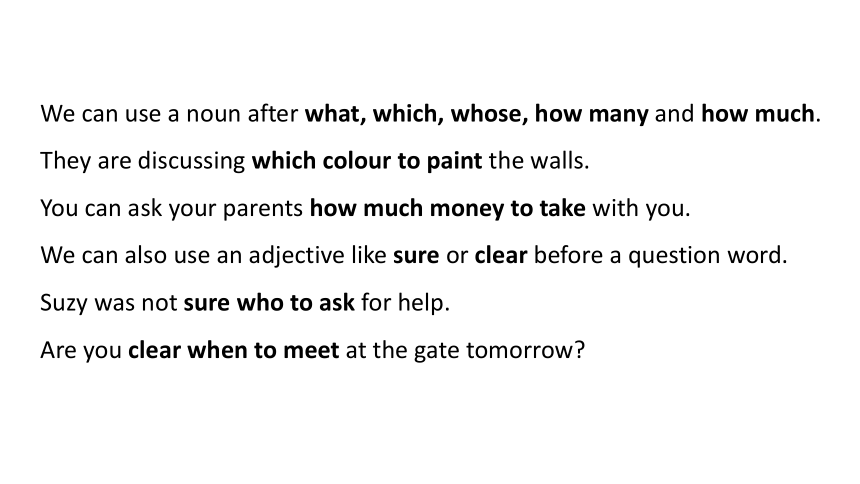
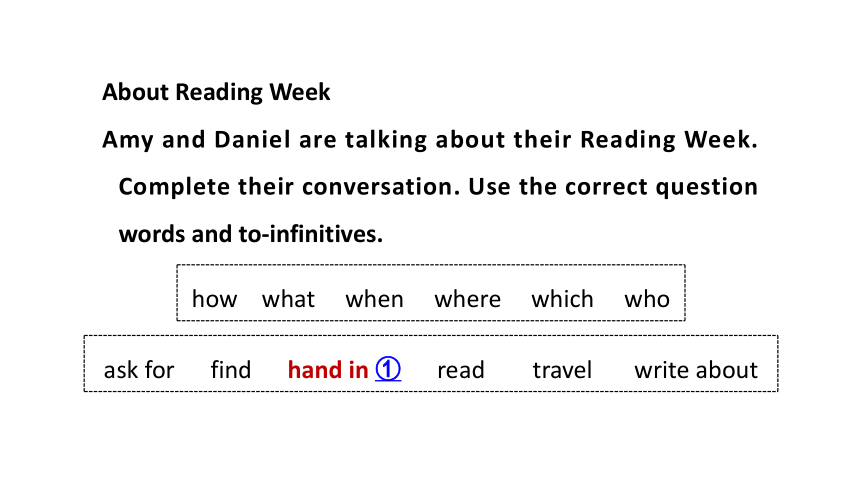


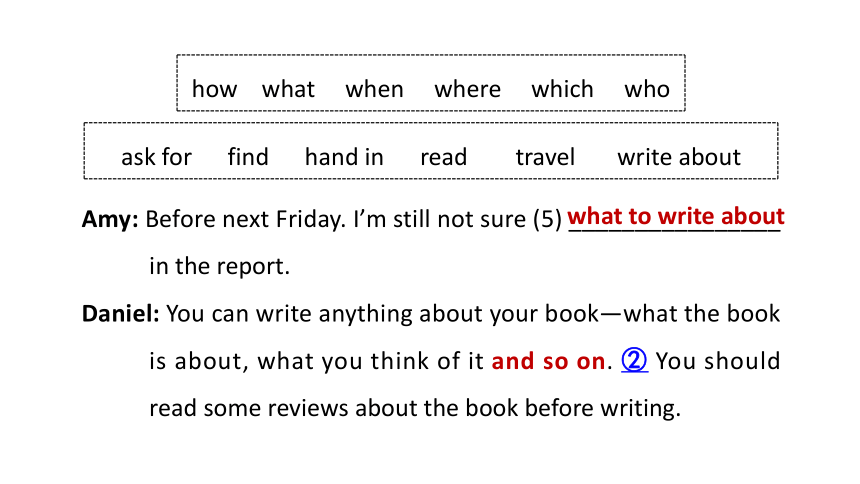
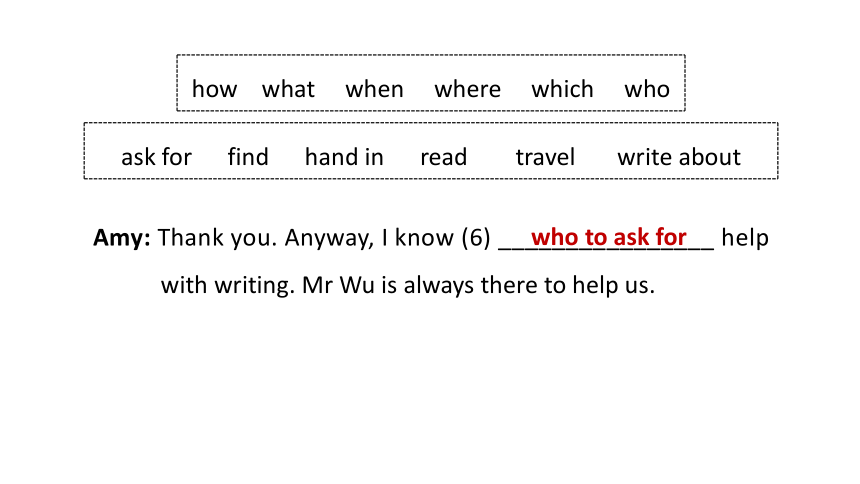
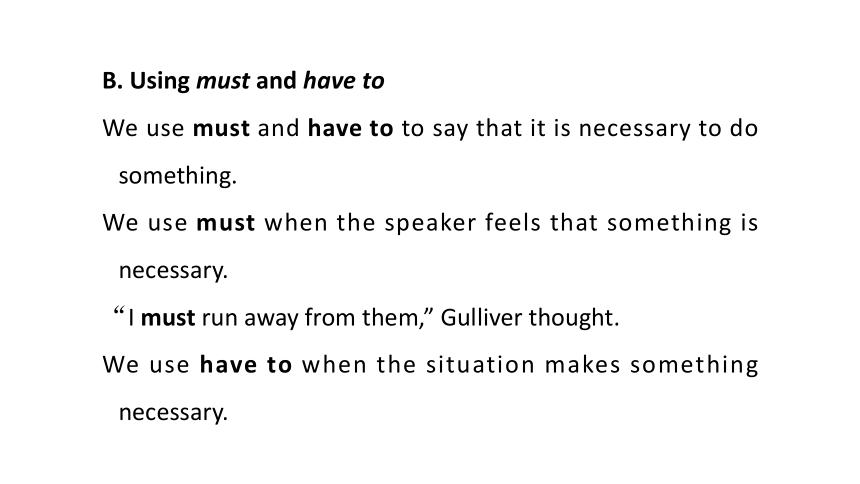
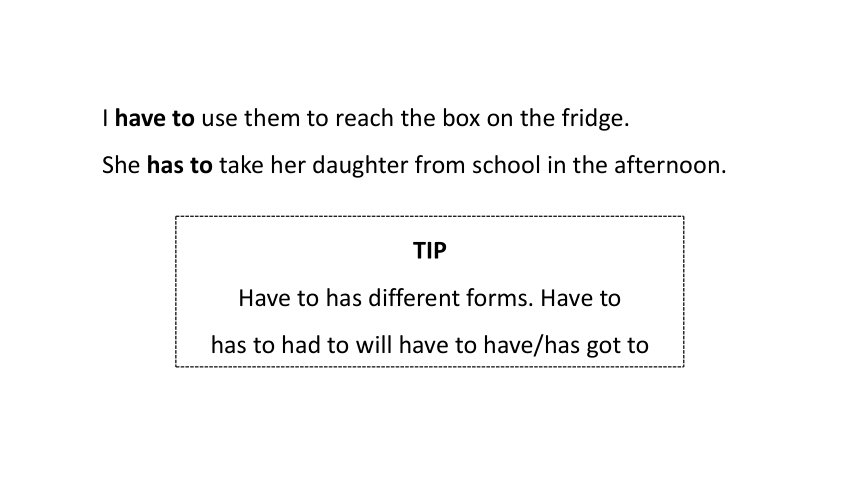
文档简介
(共34张PPT)
Unit4 A good read
Period 3 Grammar
Grammar
A. Using question words + to-infinitives
We can use a question word with a to-infinitive after a verb.
Millie has decided what to read.
Daniel did not say who to talk to about this book.
Simon forgot when to meet his friends.
课文呈现
Kitty cannot decide which to choose first.
Sandy is wondering where to ask for help.
Amy does not know how to write the report.
All question words can be used in this way, except why.
× Suzy will explain why to recommend this book.
√ Suzy will explain why she recommends this book.
We can use a verb and an object before a question word with a to-infinitive.
Mr Wu advised us which to choose as after-school activities.
The students asked their teacher when to hand in their work.
Millie showed us what to do next.
Daniel taught himself how to use a computer to draw.
Don’t forget to tell your mum where to meet you.
advise ask decide discuss find out
forget know learn remember say
show teach think understand wonder
We can use a noun after what, which, whose, how many and how much.
They are discussing which colour to paint the walls.
You can ask your parents how much money to take with you.
We can also use an adjective like sure or clear before a question word.
Suzy was not sure who to ask for help.
Are you clear when to meet at the gate tomorrow
About Reading Week
Amy and Daniel are talking about their Reading plete their conversation. Use the correct question words and to-infinitives.
how what when where which who
ask for find hand in ① read travel write about
Amy: Mr Wu has recommended so many interesting books. Have you decided (1) ______________ first, Daniel
Daniel: Yes. I want to read Black Beauty first. But I don’t know (2) ______________ the book.
which to read
where to find
how what when where which who
ask for find hand in read travel write about
Amy: You can try our school library or Sunshine Library. Oh, did you know Peter is reading Around the World in Eighty Days He wants to find out (3) ______________ around the world in such a short time.
Daniel: Wow, that’s amazing! By the way, can you tell me (4) ________________ our book report
how to travel
when to hand in
how what when where which who
ask for find hand in read travel write about
Amy: Before next Friday. I’m still not sure (5) ________________ in the report.
Daniel: You can write anything about your book—what the book is about, what you think of it and so on. ② You should read some reviews about the book before writing.
what to write about
how what when where which who
ask for find hand in read travel write about
Amy: Thank you. Anyway, I know (6) ________________ help with writing. Mr Wu is always there to help us.
who to ask for
how what when where which who
ask for find hand in read travel write about
B. Using must and have to
We use must and have to to say that it is necessary to do something.
We use must when the speaker feels that something is necessary.
“I must run away from them,” Gulliver thought.
We use have to when the situation makes something necessary.
I have to use them to reach the box on the fridge.
She has to take her daughter from school in the afternoon.
TIP
Have to has different forms. Have to
has to had to will have to have/has got to
We use must not to say that something is not allowed.
You must not smoke in the library.
We use do not have to to say that it is not necessary to do something.
We do not have to go to school at weekends.
TIP
must not = mustn’t
do not have to = don’t have to
Library rules
Amy is telling her cousin Shirley some library plete what she says with must, must not, have to or do not have to.
You (1) ________ keep quiet in the library.
You (2) ________ keep the books clean and tidy. You (3) ____________ draw or write in the books.
must
must
must not
You (4) ____________ eat or drink in the library.
You (5) ___________ return the books on time. ③ If you want to keep them longer, you (6) ____________ renew them.
You (7) ________________ bring your student card every time you go to the library, but remember to bring your library card.
must not
must
have to
do not have to
① hand in
hand in 上交
e.g. All of you must hand in your homework tomorrow morning.
你们所有人明天早上必须上交你们的家庭作业。
Please hand it in this afternoon. 请今天下午上交它。
考点1
hand in 为动词加副词结构,若后接代词it或them 作宾语时,则放在hand in 中间,即hand it/them in。
考点精讲
②You can write anything about your book—what the book is about, what you think of it and so on.
and so on ……等等
考点2
and so on 之前的举例都是用逗号隔开的,
不能用and 连接。
e.g. This shop sells clothes, shoes, hats and so on.
这个商店卖衣服、鞋、帽子等等。
I like many sports, such as football, basketball, badminton, table tennis and so on.
我喜欢很多运动, 例如足球、篮球、羽毛球、乒乓球等等。
We discussed everything—when to go, what to see and so on.
我们什么都商量过了——什么时候走、看什么等等。
③ You (5) ______ return the books on time.
on time 准时
e.g. We get there on time. 我们准时到达那里。
考点3
time 的其他常见搭配:
in time 及时
at times 有时
疑问词+ 动词不定式
考点1
“疑问词+ 动词不定式”可在句中用作宾语、主语和表语。
e.g. Can you tell me how to spell the word
你能告诉我怎么拼写这个单词吗?
How to go there is a question.
如何去那里是个问题。
考向1
语法沙龙
“疑问词+ 动词不定式”作宾语是初中阶段的重点。在“疑问词+ 动词不定式” 结构中,只有疑问词why 不能与不定式连用。有些疑问词,其后可先接名词再接动词不定式。作宾语时,此结构常用于know, learn, see, hear, ask, tell, advise, decide, explain, find out, forget, remember, think, understand, wonder 等动词或动词短语后;也可用于sure,clear 等形容词后。
考向2
e.g. The teacher is telling the students what to do.
老师正告诉学生们要做什么。
Have you found out what time to start
你查清楚什么时间开始了吗?
I am not sure which way to take.
我不确定走哪条路。
“疑问词+ 动词不定式”结构可以改写为该疑问词引导的从句。
e.g. We do not know what to do.
=We do not know what we should do.
我们不知道该做什么。
考向3
must 和have to
考点2
must 的用法
must 为情态动词,后接动词原形。must 侧重于表示说话人的主观意愿;must not 语气比较强,表示“禁止,不允许”。 Must I... 的否定回答用“No, you needn’t. ”或“No, you don’t have to.”。
考向1
have to 的用法
have to 意为“不得不”,侧重于表示客观需要;第三人称单数形式为has to。
考向2
一、用所给词的适当形式填空
1. He told his teacher that he didn’t know how _______ (deal) with his problem. [常州新北区模拟]
2. Let’s discuss where _________(go) after our exam.
3. Millie does not know which dress _____________ (choose) for her mother.
to deal
to go
to choose
课堂练习
4. She has to _________(stay) at home and look after her sister.
5. You must _________(go) to the doctor because your temperature is higher than usual. [南京]
stay
go
二、单项选择
6. — Allen, shall we go to the bookstore this afternoon
— I’m sorry, David, but I ______ meet my cousin at the train station. [青岛]
A. have to B. can C. may D. could
A
7. According to the new traffic rules, people _________ wear a helmet when riding an e-bike. [苏州]
A. might B. may C. can D. must
D
8. — According to the school rules, the students _________ get their ears pierced.
— I think that’s right. Students should pay more attention to their study. [鞍山]
A. mustn’t B. can C. needn’t D. should
A
9. —Must I return this book before Friday, Sir [南通]
— No, you ______, dear. You can keep it for two weeks.
A. can’t B. shouldn’t C. mustn’t D. needn’t
D
10. — My family will go on a trip to Beijing this summer, but we haven’t decided _________.
—Why not take the high-speed railway [常州]
A. when to leave B. how to get there
C. which hotel to choose D. how long to stay there
B
本节课主要学习了:
重点单词:hand,review
重点短语:write about,and so on
重点句式:Millie has decided what to read.
归纳新知
再见
Unit4 A good read
Period 3 Grammar
Grammar
A. Using question words + to-infinitives
We can use a question word with a to-infinitive after a verb.
Millie has decided what to read.
Daniel did not say who to talk to about this book.
Simon forgot when to meet his friends.
课文呈现
Kitty cannot decide which to choose first.
Sandy is wondering where to ask for help.
Amy does not know how to write the report.
All question words can be used in this way, except why.
× Suzy will explain why to recommend this book.
√ Suzy will explain why she recommends this book.
We can use a verb and an object before a question word with a to-infinitive.
Mr Wu advised us which to choose as after-school activities.
The students asked their teacher when to hand in their work.
Millie showed us what to do next.
Daniel taught himself how to use a computer to draw.
Don’t forget to tell your mum where to meet you.
advise ask decide discuss find out
forget know learn remember say
show teach think understand wonder
We can use a noun after what, which, whose, how many and how much.
They are discussing which colour to paint the walls.
You can ask your parents how much money to take with you.
We can also use an adjective like sure or clear before a question word.
Suzy was not sure who to ask for help.
Are you clear when to meet at the gate tomorrow
About Reading Week
Amy and Daniel are talking about their Reading plete their conversation. Use the correct question words and to-infinitives.
how what when where which who
ask for find hand in ① read travel write about
Amy: Mr Wu has recommended so many interesting books. Have you decided (1) ______________ first, Daniel
Daniel: Yes. I want to read Black Beauty first. But I don’t know (2) ______________ the book.
which to read
where to find
how what when where which who
ask for find hand in read travel write about
Amy: You can try our school library or Sunshine Library. Oh, did you know Peter is reading Around the World in Eighty Days He wants to find out (3) ______________ around the world in such a short time.
Daniel: Wow, that’s amazing! By the way, can you tell me (4) ________________ our book report
how to travel
when to hand in
how what when where which who
ask for find hand in read travel write about
Amy: Before next Friday. I’m still not sure (5) ________________ in the report.
Daniel: You can write anything about your book—what the book is about, what you think of it and so on. ② You should read some reviews about the book before writing.
what to write about
how what when where which who
ask for find hand in read travel write about
Amy: Thank you. Anyway, I know (6) ________________ help with writing. Mr Wu is always there to help us.
who to ask for
how what when where which who
ask for find hand in read travel write about
B. Using must and have to
We use must and have to to say that it is necessary to do something.
We use must when the speaker feels that something is necessary.
“I must run away from them,” Gulliver thought.
We use have to when the situation makes something necessary.
I have to use them to reach the box on the fridge.
She has to take her daughter from school in the afternoon.
TIP
Have to has different forms. Have to
has to had to will have to have/has got to
We use must not to say that something is not allowed.
You must not smoke in the library.
We use do not have to to say that it is not necessary to do something.
We do not have to go to school at weekends.
TIP
must not = mustn’t
do not have to = don’t have to
Library rules
Amy is telling her cousin Shirley some library plete what she says with must, must not, have to or do not have to.
You (1) ________ keep quiet in the library.
You (2) ________ keep the books clean and tidy. You (3) ____________ draw or write in the books.
must
must
must not
You (4) ____________ eat or drink in the library.
You (5) ___________ return the books on time. ③ If you want to keep them longer, you (6) ____________ renew them.
You (7) ________________ bring your student card every time you go to the library, but remember to bring your library card.
must not
must
have to
do not have to
① hand in
hand in 上交
e.g. All of you must hand in your homework tomorrow morning.
你们所有人明天早上必须上交你们的家庭作业。
Please hand it in this afternoon. 请今天下午上交它。
考点1
hand in 为动词加副词结构,若后接代词it或them 作宾语时,则放在hand in 中间,即hand it/them in。
考点精讲
②You can write anything about your book—what the book is about, what you think of it and so on.
and so on ……等等
考点2
and so on 之前的举例都是用逗号隔开的,
不能用and 连接。
e.g. This shop sells clothes, shoes, hats and so on.
这个商店卖衣服、鞋、帽子等等。
I like many sports, such as football, basketball, badminton, table tennis and so on.
我喜欢很多运动, 例如足球、篮球、羽毛球、乒乓球等等。
We discussed everything—when to go, what to see and so on.
我们什么都商量过了——什么时候走、看什么等等。
③ You (5) ______ return the books on time.
on time 准时
e.g. We get there on time. 我们准时到达那里。
考点3
time 的其他常见搭配:
in time 及时
at times 有时
疑问词+ 动词不定式
考点1
“疑问词+ 动词不定式”可在句中用作宾语、主语和表语。
e.g. Can you tell me how to spell the word
你能告诉我怎么拼写这个单词吗?
How to go there is a question.
如何去那里是个问题。
考向1
语法沙龙
“疑问词+ 动词不定式”作宾语是初中阶段的重点。在“疑问词+ 动词不定式” 结构中,只有疑问词why 不能与不定式连用。有些疑问词,其后可先接名词再接动词不定式。作宾语时,此结构常用于know, learn, see, hear, ask, tell, advise, decide, explain, find out, forget, remember, think, understand, wonder 等动词或动词短语后;也可用于sure,clear 等形容词后。
考向2
e.g. The teacher is telling the students what to do.
老师正告诉学生们要做什么。
Have you found out what time to start
你查清楚什么时间开始了吗?
I am not sure which way to take.
我不确定走哪条路。
“疑问词+ 动词不定式”结构可以改写为该疑问词引导的从句。
e.g. We do not know what to do.
=We do not know what we should do.
我们不知道该做什么。
考向3
must 和have to
考点2
must 的用法
must 为情态动词,后接动词原形。must 侧重于表示说话人的主观意愿;must not 语气比较强,表示“禁止,不允许”。 Must I... 的否定回答用“No, you needn’t. ”或“No, you don’t have to.”。
考向1
have to 的用法
have to 意为“不得不”,侧重于表示客观需要;第三人称单数形式为has to。
考向2
一、用所给词的适当形式填空
1. He told his teacher that he didn’t know how _______ (deal) with his problem. [常州新北区模拟]
2. Let’s discuss where _________(go) after our exam.
3. Millie does not know which dress _____________ (choose) for her mother.
to deal
to go
to choose
课堂练习
4. She has to _________(stay) at home and look after her sister.
5. You must _________(go) to the doctor because your temperature is higher than usual. [南京]
stay
go
二、单项选择
6. — Allen, shall we go to the bookstore this afternoon
— I’m sorry, David, but I ______ meet my cousin at the train station. [青岛]
A. have to B. can C. may D. could
A
7. According to the new traffic rules, people _________ wear a helmet when riding an e-bike. [苏州]
A. might B. may C. can D. must
D
8. — According to the school rules, the students _________ get their ears pierced.
— I think that’s right. Students should pay more attention to their study. [鞍山]
A. mustn’t B. can C. needn’t D. should
A
9. —Must I return this book before Friday, Sir [南通]
— No, you ______, dear. You can keep it for two weeks.
A. can’t B. shouldn’t C. mustn’t D. needn’t
D
10. — My family will go on a trip to Beijing this summer, but we haven’t decided _________.
—Why not take the high-speed railway [常州]
A. when to leave B. how to get there
C. which hotel to choose D. how long to stay there
B
本节课主要学习了:
重点单词:hand,review
重点短语:write about,and so on
重点句式:Millie has decided what to read.
归纳新知
再见
